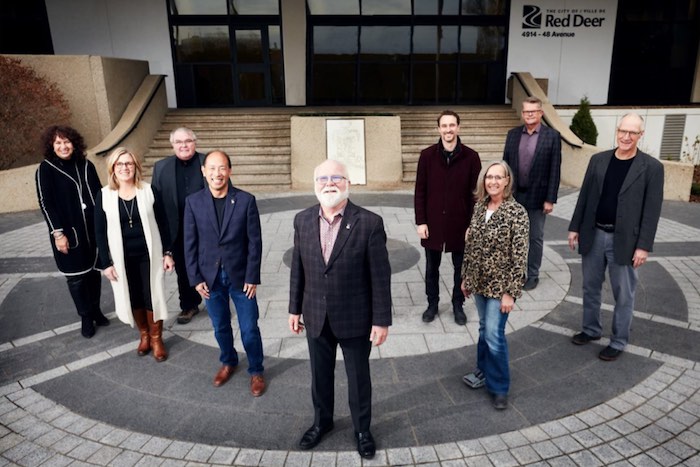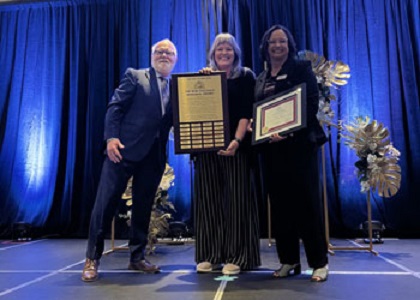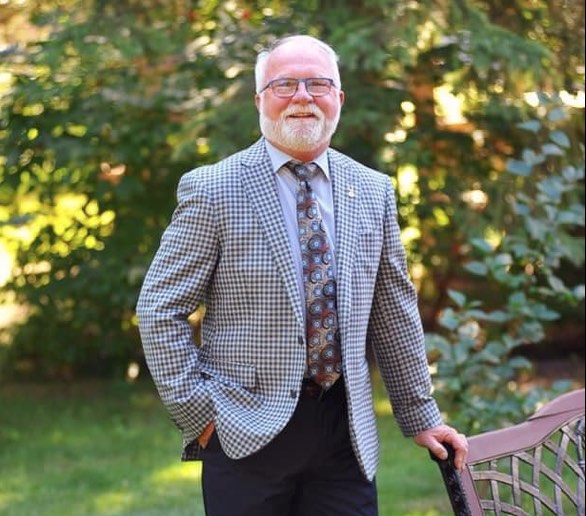City of Red Deer
City Council to develop implementation strategies for 80 recommendations from Diversity and Inclusion plan

Red Deer’s Community Informed Diversity + Inclusion Plan
The following nine priorities were developed from engagement with diverse and marginalized community members in Red Deer. They represent a beginning point for action to enhance community wellbeing through increasing equitable access and celebrating diversity. The expectation is that City staff and leaders, and community organizations and members, will collaborate together and assume joint responsibility for progressing actions which address these priorities. This will be done in an equitable way, recognizing that the City has more access to structural power and the resources needed to mobilize these actions, and that marginalized communities have more insight into which actions will provide an effective outcome. It is recommended that a Diversity and Inclusion Framework will be developed to expand on and further plan to address these priorities and recommendations.
Priority One: Address Mistreatment in Communities, Workplace and Education Systems
1. Develop a hate and discrimination response model for the city, including bystander behaviours and responses.
2. Work with school boards to track and respond to experiences of discrimination and mistreatment against marginalized people in education.
3. Create more opportunities for English language training, as well as opportunities to learn to embrace and support speakers of English with diverse accents and for whom English is not a native or first language.
4. Encourage the enforcement and enhancement of employment policies and standards that address mistreatment and inequity in the workplace.
5. Reduce barriers to gaining employment for marginalized groups by increasing knowledge and education among recruiters and employers, and encouraging the adoption of best practices to end discriminatory in hiring processes.
6. Lead with hiring diversity, valuing divergent perspectives and appropriately responding to cultural communication and work ethic differences in workplaces.
7. Provide more opportunities for business training, education and support for historically marginalized people struggling to access the labour market.
8. Review bylaws and develop and implement programs which reduce the mistreatment of people experiencing houselessness, homelessness and addictions in the community and when accessing services and healthcare.
9. Work with policing and extremist prevention groups such as the Alberta Hate Crimes Committee and the Organization for the Prevention of Violence to understand the factors causing vulnerability to recruitment into hate-based organizations and develop an action plan to prevent this.
10. Provide resources to the Welcoming and Inclusive Community Network to generate educational opportunities for programs such as Radicalization Leading to Violence.
11. Recognizing the value of addressing the unique context and needs of Indigenous people specifically, create pathways for interaction and collaboration between efforts to improve Indigenous people specifically, create pathways for interaction and collaboration between efforts to improve Indigenous Relations and Reconciliation, and broader Diversity and Inclusion.
Priority Two: Address Inequity
12. Increase and grow relationships, connections and representation from members of Indigenous communities, and members with intersecting identities from historically marginalized communities in decision-making and program development that impact their wellbeing, access and participation.
13. Encourage and incentivize marginalized communities to evaluate how they are responding to the needs of the even more marginalized people within their communities (e.g. 2LGBTQ+, disabled, women, etc.) by linking this value to funding and program development
14. Facilitate increased representation of marginalized people on council committees, community boards, service club memberships, and other similar structures
15. Challenge ‘tokenism’ by recruiting for multiple representatives from historically marginalized communities, encourage their relationship-building with each other, and plan to support their needs.
16. Include a diversity of organizations represented in engagement and partnerships, and grow this network.
17. Partner with marginalized communities and voices in the development and implementation of initiatives and programs.
18. Increase diversity in hiring, beginning with employment with the City.
19. When hiring, value Indigenous knowledge and lived experience, and lived experience of inequity, alongside or instead of educational experience; and create preferences for these experiences.
20. Explore and promote ways to recognize value in qualifications from other countries that are not currently validated by the Canadian system.
21. Address dominant culture advantage in interviews.
22. Support diverse cultural behaviours and responses, and challenge expectations for complete assimilation to the dominant culture.
23. Facilitate and incentivize employers to create organizational cultures capable of properly supporting the needs of employees with lived experience of marginalization in every level of an organization, and ensuring access to opportunities.
Priority Three: Increase Accessibility and Community Participation
24. Increase access to support for English language learning and understanding, including at shelters and drug court, and by providing translation tools for the City website and service materials.
25. Hire people with lived experience of marginalization who can provide their lens in planning and development. For example, hire people with disabilities who can provide a disability lens on planning and programming.
26. Provide clarity of the system for accessing services and create pathways to communicate this clarity to historically marginalized communities.
27. Increase resources to support accessible participation of marginalized people in all aspects of life.
28. Ensure full mobility access in the community, including sidewalks during the winter, washrooms, parking and transportation.
29. Create places for practicing faith, culture and Indigenous ceremony – in City workplaces and other community areas.
30. Ensure the City’s support for Reconciliation, Equity, Accessibility, Diversity and Inclusion is visible and celebrated, for example the subsidized bus passes for newcomers and marginalized people.
31. Create access to social agency support outside of work hours, to facilitate people who cannot call for support services during their work hours.
32. Provide resources to the City supported Red Deer Welcoming and Inclusive Community Network.
Priority Four: Increase Baseline Levels of Essential Knowledge Needed to Support Diversity and Inclusion
33. Inform the mainstream community of the value of making an effort with language for newcomers.
34. Inform Red Deer residents of inclusivity definitions and how to participate in creating inclusive environments.
35. Provide the community with humanizing stories of marginalized people. Examples could be demonstrating the impact of intergenerational trauma on experiencing addiction or how any individual is ‘a pay cheque away from being on the street’.
36. Support staff and community members to be cognizant of the power of words, use clear and inclusive language and take effective actions.
37. Support the people of Red Deer to know the true history of colonization in Canada and Red Deer, racism in Canada and Red Deer, what are Treaty 6 and 7 obligations, and what legislative and structural barriers to equity are currently affecting the lives of Indigenous people and other marginalized people.
38. Increase awareness among staff and community of systemic oppression, and the roles of systemically privileged identities and positions in both enforcing and challenging that oppression.
39. Educate City staff at all levels on issues of diversity, inclusion and equity.
40. Create opportunities to learn from community members and experts with lived experiences of marginalization, including lived experience of disabilities.
41. Support workplace learning events like ‘diversity conversations’.
42. Address the root causes of fear, ignorance and miseducation about ‘others’.
43. Increase community and staff skills in respecting and listening to diverse ideas, opinions, and cultural points of view.
44. Understand that one’s impact towards another is not limited to one’s words but is also affected by tone and one’s ability to connect with each other.
45. Uphold standards for media reporting in relation to issues of diversity and inclusion and stand against reinforcing incorrect stereotypes and discriminatory ideas.
46. Clearly understand and promote the difference between ‘equality’ and ‘equity’, favouring working towards equity.
47. Facilitate community and staff understandings of the lived experiences, needs and issues of transgender people, HIV positive people, and people living with homelessness and/or addictions, in order to effectively respond to these needs.
Priority Five: Create Opportunities to Nurture a Greater Sense of Connection
48. Take actions that increase empathy for people from diverse identities, in community and workplaces.
49. Increase coordination between service agencies.
50. Share resources, including being reciprocal about engagement and research, sharing information, and facilitating exchanges for the ‘things’ people need.
51. Create opportunities and ways for all people to come together. For example, through the downtown market place, monthly community events at performing arts centre, open hub on Ross, community marketplace, a ‘Culture fest’ centring children and food, community gardens, potlucks. *
52. Support workplace culture events. *
53. Provide grants for community events.
54. Provide a sense of belonging and connection through the lights at City Hall.
55. Support increased connection and communication between neighbours
56. Provide community dinners to all people, and including people living with homelessness.
57. Support resource allocation and access to services for mental wellbeing and healing from trauma for people from marginalized communities.
* Note: These community suggestions are multicultural solutions; intentional equity-focused and intercultural event planning is also needed.
Priority Six: Develop and Communicate a city Culture of Diversity and Inclusion
58. Consciously develop Red Deer’s culture of diversity and inclusivity, including shared values, principles, beliefs and expected behaviours.
59. Promote this inclusive culture through a communication strategy and campaigns that increase awareness, encourage examples of positive behaviours and provide opportunities for the people of Red Deer to get involved and show their alignment.
60. Encourage the buy-in of local businesses and organizations into Red Deer’s culture of inclusivity and the Diversity and Inc.
Priority Seven: Build Trust by Acting Visibly and with Accountability Community Recommendations for City of Red Deer
61. Visible participation of City Mayor, Councillors, leadership and managers in taking action for diversity and inclusion.
62. Seek facilitated diversity and inclusion education for City Mayor, Councillors, leadership and managers so they can participate as informed champions and models of inclusive work.
63. Work with communities in the development and implementation of proclamations and events.
64. Coordinate planning around honouring Black History Month, Asian and Pacific Islander Heritage Month, Pride Month, Indigenous Heritage Month, Truth and Reconciliation, Disability Employment Awareness Month, Trans Day of Remembrance, and other important events.
65. Ask applicants for their hiring and diversity policies as part of funding applications and through the procurement process.
66. Solicit buy-in for the Community Informed: Diversity and Inclusion Plan and Framework across businesses and organizations in the city.
67. Produce an internal diversity survey to be administered annually or biannually.
68. Re-enact the City of Red Deer Diversity and Inclusion Team.
69. Community Recommendations for all Red Deer Corporate Entities
70. Undertake an internal review of policies, procedures, and programs for inclusive language and lens.
71. Provide Respect, Equity, Accessibility, Diversity and Inclusion (READI) and Gender-Based Analysis Plus (GBA+) education for all internal staff to impact both internal relationships and external engagement.
72. Appoint a READI Coordinator position that works systemically or interdepartmentally, thereby reducing the silo effect.
Priority Eight: Address Inequities and Mistreatments Within and Between Marginalized Communities
73. Provide accurate education and information for newcomers on the colonial history of Canada, structural racism against Indigenous peoples, the legislations currently contributing to the oppression against Indigenous peoples, and Treaties 6 and 7 and the Metis Nation.
74. Provide information and context for Land Acknowledgements, and in language easily understood by people for whom English is not a primary language.
75. Support community-driven healing, relationship building and restorative justice practices within and between marginalized communities.
76. Addressing mistreatment within and between marginalized communities requires insight, awareness, humility and the ability to listen to and collaborate with the most marginalized and impacted in any situation. The City of Red Deer is committed to supporting healthy relationships within and between marginalized communities.
Priority Nine: Be a Powerful Advocate
77. Advocate to reduce wait times for services.
78. Advocate for the health services needs of marginalized people, especially Indigenous people, asylum seekers and refugees, transgender people, 2SLGBTQ+ people, HIV positive people, children, people with disabilities and people living with homelessness and/or addictions.
79. Advocate for an increase in resources and impactful diversity and inclusion policies and programs from the province.
80. Recommit to fulfilling the obligations of the Coalition of Inclusive Municipalities.
City of Red Deer
City of Red Deer Employee Honoured with Bob Stollings Memorial Award for Outstanding Contributions

Annette Scheper, Community & Program Facilitator in the Safe & Healthy Communities Department is The City’s 2025 recipient of the Bob Stollings Memorial Award.
The Bob Stollings Memorial Award is given out each year to a City employee who displays outstanding performance in alignment with The City’s RISE cornerstone values – respect, integrity, service and excellence. Nominations for the award are submitted by fellow coworkers detailing the employee’s achievements professionally and interpersonally, along with letters of support. The award is considered a great honour among City staff.
With an impressive 22-year career, Annette has played a pivotal role in shaping Red Deer’s cultural and special events landscape. Her leadership and innovation have brought thousands of successful events to life, creating lasting traditions that enrich the lives of residents. Her commitment to excellence and resourcefulness has ensured that community initiatives are inclusive, accessible, and impactful.
One of Annette’s most notable achievements is the development of the Community Loan Program, which provides essential resources for local groups, contributing an annual value of $86,778.95 back into the community. In addition, she has successfully led and executed a variety of large-scale events, demonstrating remarkable problem-solving skills and a dedication to sustainability. From creating elaborate event designs with repurposed materials to managing complex logistics, she continuously sets the standard for excellence.
“Annette exemplifies the best of our organization,” said City Manager, Tara Lodewyk. “Her unwavering dedication, innovative thinking, and ability to bring people together has made a profound impact on our city. This award is a testament to her hard work and passion for creating meaningful experiences for our community.”
The Bob Stollings Memorial Award was first established in 1985 and is presented every year to honour Robert (Bob) E. Stollings, a loyal and dedicated City employee from 1960-1984.
City of Red Deer
Red Deer will choose a new Mayor as Ken Johnston decides to step away

It’s a telling detail about the person who leads Red Deer City Council. Always putting the city’s needs ahead of his own, Mayor Ken Johnston has announced his intentions within days of the opening of Nominations for October’s municipal elections,
After 12 years on council, Mayor Ken Johnston has decided against running for a second term as Mayor this fall. Johnson shared his decision in front of colleagues and supporters in a touching announcement on Wednesday.
At 71 years old, Johnston remains vibrant, passionate and healthy. He says that’s exactly why he and his wife Carolyn have decided now is the right time to start their next stage of life together.
Mayor Johnston listed a number of highlights and achievements he can look back on, including his help advocating for the redevelopment of Red Deer Regional Hospital, the growth of Red Deer Polytechnic, and positive moves in Economic Development.
All these lead of a feeling of ease about the decision to step away, though affordable housing and a permanent shelter for the homeless remain pressing concerns.
With about 8 months remaining in his term, Mayor Johnston is planning to push hard to move the needle on these housing issues.
“We’re looking forward to some more work and we’ll be going to the community shortly about it. So I still have optimism that maybe before the term is out we can have an announcement.”
This is the second major political announcement in Central Alberta in the last number of days. Earlier this week Red Deer Mountain View MP Earl Dreeshen announced he won’t be running in the next federal election.
-

 COVID-196 hours ago
COVID-196 hours agoOntario man launches new challenge against province’s latest attempt to ban free expression on roadside billboards
-

 Energy14 hours ago
Energy14 hours agoThis Canada Day, Celebrate Energy Renewal
-

 Business1 day ago
Business1 day agoWhile China Hacks Canada, B.C. Sends Them a Billion-Dollar Ship Building Contract
-

 Alberta1 day ago
Alberta1 day agoSo Alberta, what’s next?
-

 Alberta5 hours ago
Alberta5 hours agoAlberta Next Takes A Look At Alberta Provincial Police Force
-

 Bjorn Lomborg1 day ago
Bjorn Lomborg1 day agoThe Physics Behind The Spanish Blackout
-

 Alberta7 hours ago
Alberta7 hours agoCanadian Oil Sands Production Expected to Reach All-time Highs this Year Despite Lower Oil Prices
-

 Business9 hours ago
Business9 hours agoPotential For Abuse Embedded In Bill C-5





